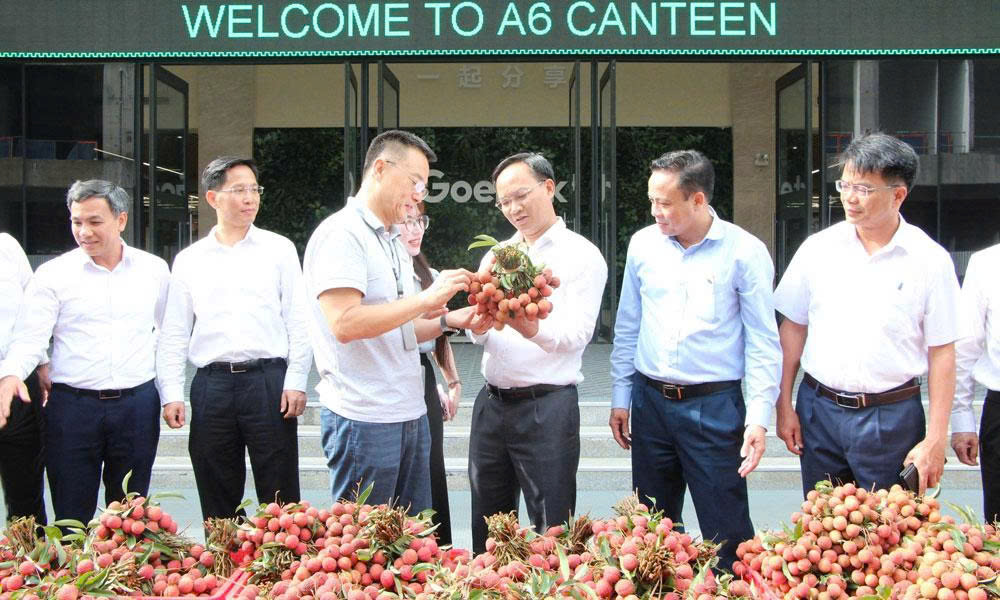OCOP programme standardises local products and promotes rural economic development
What are the targets of OCOP programme?
OCOP programme aims to develop the rural economy toward internal growth with increased value. To well implement the programme, the provincial People’s Committee approved the Project “OCOP programme in Bac Giang province in the period 2018 – 2020, with a vision to 2030”.
 |
|
Deputy Director of Bac Giang provincial Department of Agriculture and Rural Department Nguyen Viet Toan. |
It targets to develop and standardise at least 50 percent of the current agricultural and craft village products, in which not less than 3 OCOP products will be qualified as national 5 star level by 2020 (Luc Ngan lychee, Chu rice noodle and Yen The hill chicken) as well as reinforce and develop the business and production forms so that the traditional products can meet the standard and have competitiveness on the market.
Could you name some difficulties to Bac Giang province during implementing OCOP programme, please?
Bac Giang province encountered several difficulties in actual execution. Though the province has many products, most of them are hand made with limited task to ensure food hygiene and safety.
Meanwhile the package, label and stamp for origin traceability are not completed, making it hard to compete with the same products on the markets.
Many producers got used to passive method of development with raw products which are mostly consumed via tradesmen. The local producers hardly pay attention to building the trademark, promoting the products, especially via electronic commerce.
Could you inform about some certain results on OCOP programme at the moment?
OCOP is a new programme launched since July 2018 with some dramatic achievements. Particularly, 70 products were registered, 62 of which were selected and approved by the provincial judge. The judge selected over 30 outstanding products representing the localities to consult for completion.
 |
|
Hoang Van black canarium (Tram den) is the OCOP product of Hiep Hoa district widely preferred by many customers. |
The DARD has coordinated with agency to consult directly to 35 products in the districts and city. Besides, the website of “OCOP products” in Bac Giang province (http://ocop.bgo.vn/) was completed to provide necessary information about implementing OCOP programme.
Now, the necessary formalities and profile of the products which were surveyed and consulted are completed per requirement of criteria set to be evaluated and classified as 2019 OCOP product. The evaluation will be finished before November 10, 2019 at district level and December 15, 2019 at provincial level.
What are the measures Bac Giang province will focus on to widely promote the OCOP product, improve the farmers’ income and rural economy in the upcoming time?
To build effective product with higher income to the locals, it is necessary to communicate and increase the awareness to the whole society to deeply understand the purpose and meaning of OCOP programme, hence boosting the production, facilitating and inspiring the producers to invest and develop the advantage products in local area.
The commodity products and diverse service should be developed toward hi-quality to meet the standard of different markets and attach to suitable production model.
The producers must concentrate on building the trademarks, brands, geological identification, stamp for origin traceability; registering the establishment, protection and implementation of the intellectual property right for OCOP products; renovating the products’ appearance, package and label toward creative, impressive and unique identities so as to increase the product attraction.
Another factor is to create the policy and mechanism to support the development of OCOP product in Bac Giang province in the period 2021 – 2025, in which the investment priority should be taken to facilities, machine, equipment...to enhance the product quality; build safe food chain with strict control over the activities relating to farm produce production, processing, preservation and consumption.
Trinh Lan (reported)
 Bắc Ninh
Bắc Ninh















Reader's comments (0)